‘Nobody’s coming.’ How COVID is changing everyday life in Bay City.
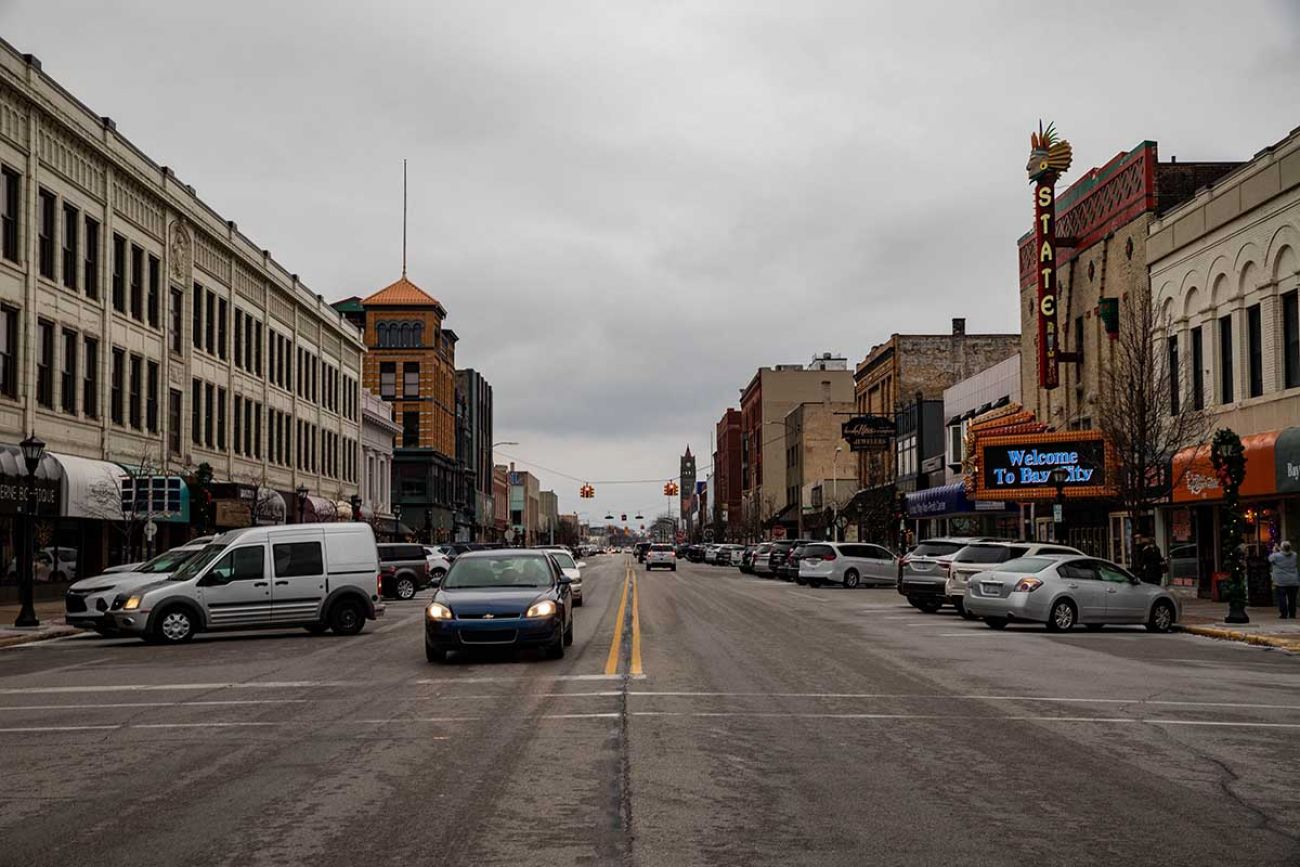

BAY CITY — The cars began arriving at 6:45 p.m., driving slowly down Center Avenue and parking along the edge of Wenonah Park in downtown Bay City.
The Christmas tree lighting ceremony on the day after Thanksgiving is an annual event for families in this traditionally blue-collar town, typically attracting at least 1,500 people. But this year, Dave Clements, who oversees the tree lighting, was not happy to see families pile out of vehicles and head into the park. Most wore masks and kept their distance, but for Clements, there were too many people amid a pandemic.
The 61-year-old retired electrical contractor had asked that there be no public celebration in 2020. Outside gatherings of more than 25 people had already been banned by the state to curb the coronavirus, an order that especially made sense in places like Bay City, which was being hammered by the pandemic.
“I was just going to flip the switch and the tree would be lit,” Clements said. “But people showed up, anyway.”
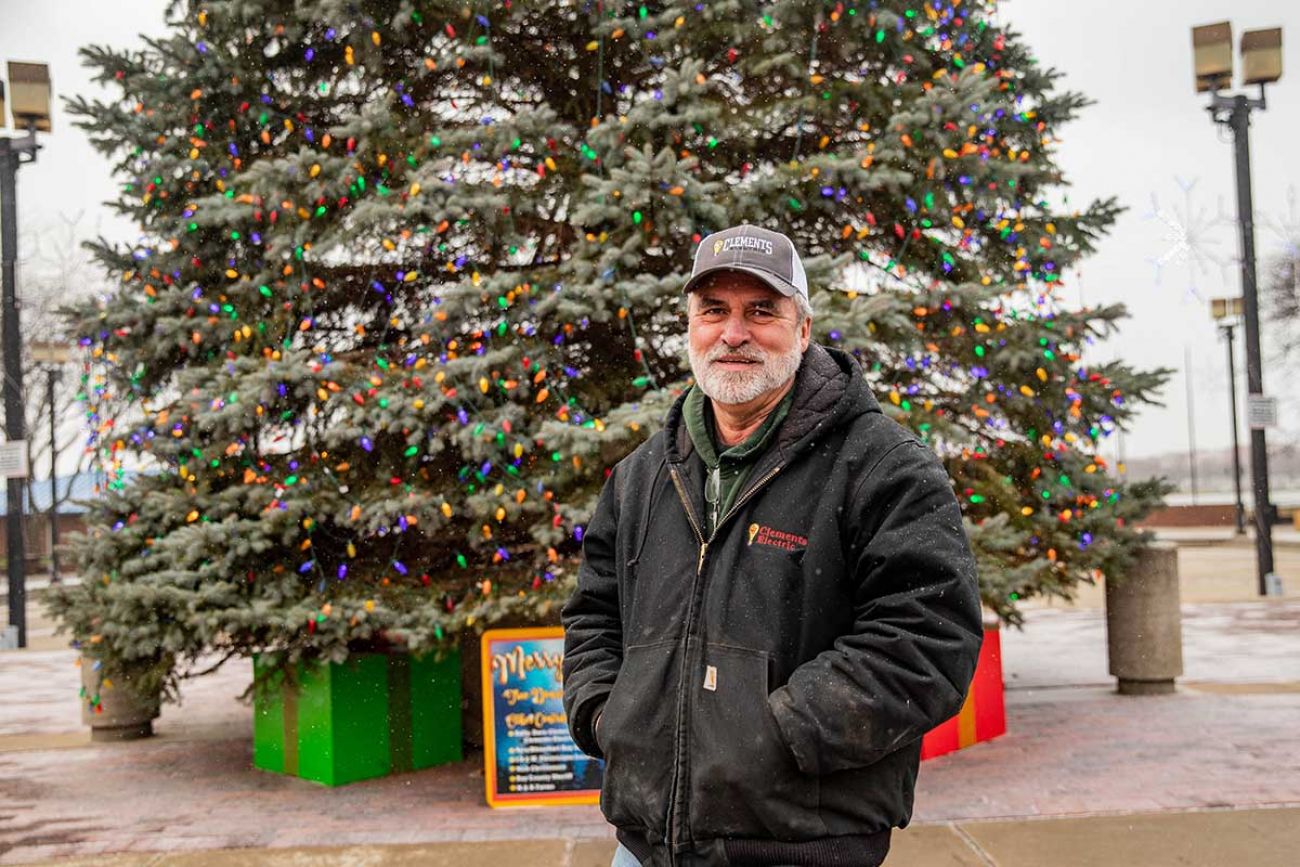
Some in town had suggested the tree not go up at all this year.
But Clements didn’t want that, either.
Not this year.
Especially not this year.
“This thing has taken so much from us,” Clements said of the coronavirus. “It wasn’t going to take our tree, too.”
COVID-19 has taken lives, jobs and businesses in this town of 33,000. But the full measure of what the pandemic has cost this tight-knit community is harder to quantify — from strained relationships to empty church choir lofts, to hair falling out from stress. From young couples missing date night at restaurants to grandparents waving at grandchildren through window panes.
Bay City is in the midst of a devastating spike in coronavirus cases. But in many ways, it is typical of plenty of towns limping through COVID, populated by residents struck personally by the virus, and neighbors who question its seriousness.
So far, the virus has killed more than 11,000 people and infected over 450,000 as it continues its march through Michigan nine months after the first case was confirmed. Two vaccines have been approved and are beginning to be deployed. While residents pine for a return to normalcy, officials caution that vaccines won’t be distributed on a mass scale in time to avoid a difficult winter.

As Christmas approaches, Bridge Michigan spoke to more than two-dozen Bay City residents about how their lives have been altered. Their stories illustrate the sometimes subtle ways the pandemic has corroded everyday life in Michigan and across the country.
Deaths and denial
Carol Taylor was feeling under the weather the last week of March. The 70-year-old had a slight fever and no energy, but no one gave it much thought. “It was so early in the pandemic, everyone thought it was just the flu,” her daughter Lisa Thackery said.
By April 2, Taylor couldn’t get out of bed, and her son took her to McLaren Bay Region Hospital.
“That was the last we saw of her,” Thackery said.
Within days of her admission for COVID, Taylor was on a ventilator. On the ninth day, her daughter received a call from nurses.
“They called me when they were doing CPR,” Thackery said, her voice cracking. “I had to tell them over the phone to stop resuscitation.”
Carol Taylor, who taught English for 25 years at Bay City All Saints High School, was one of the first COVID fatalities in Bay County. At a time when the virus was slamming metro Detroit and cutting a swath across the lower half of the state, Bay County had only 10 confirmed cases in March, and 140 in April.
After her mother died, Thackery said she was angered by how a lot of Bay City residents didn’t take the virus seriously. “People said, ‘It’s hitting Detroit, not here,’” she recalled.
Dr. Rajesh Dandamudi, a second-generation doctor in the city, said he had a friend ask him last spring “if he was naive or dumb for not being scared. And it’s neither of those things. He just didn’t know anyone who had it, so it’s not real to him. It might as well have been happening in India.”

For months, the worst of the pandemic bypassed Bay City even as cities to the south and, later, areas of northern Michigan were battered. But as a second wave crested in other parts of the state, the virus punched Bay County hard in November.
Nearly 60 percent of the county’s 174 COVID deaths have occurred in the last six weeks. And despite having less than one-sixth the population of Detroit, Bay County has had 800 more COVID cases since Nov. 1.
On a recent day at McLaren Bay Region Hospital, nearly two-thirds of the hospital’s 96 patients had tested positive for COVID-19, according to Libby Pionk, hospitalist director at McLaren Bay. McLaren has averaged a COVID death daily since early November.
Lost hair and stomach aches
Dr. Dandamudi spends much of his day with patients who aren’t infected with the coronavirus, but still have been hurt by the worst pandemic in a century. His general medicine practice switched in the spring to fully remote telemedicine. He has known many of his patients all his life; many are old, living alone and, because of the pandemic, isolated from families. He estimates half his time with his patients is now spent on non-medical issues.
“There is a lot more talking to them about their kids, their family,” Dandamudi said. “They’re starving for conversation.”
Dandamudi said he felt last spring that it would take the death of someone of prominence for the pandemic to register with most Bay City residents. That happened in September with the passing of Michael Kegley, who ran the USS Edson ship and museum docked in the Saginaw River. In early November, it was Terry Watson, a former police officer and fireworks festival president. Watson was Bay City’s premier promoter and fundraiser.
“Terry is someone everyone knew,” Dandamudi said. “In the week after he died, I was having six or seven conversations a day with patients about Terry.”
As residents die, “there won’t be anyone who doesn’t know someone who dies from this,” he said.
Indeed, it was difficult to find anyone in Bay City who hasn’t been touched in some way by the pandemic.
Coonan’s Irish Hub owner Kim Coonan fell ill this summer and, now recovered, is trying to keep his business afloat with nightly carryout specials of goulash and lasagna.
Clements, the Christmas tree organizer, said his wife and son fought through COVID this fall.
Diane Fong, director of the Bay Area Community Foundation, said her sister, who is 56 and suffers from COPD, tested positive last week.
And third-grade teacher Amanda Walker knows 10 people who recently tested positive.
“I text them, I check their social media to see if they’re OK,” Walker said. “It’s always in the back of my mind. I don’t have any pre-existing conditions, I’m pretty young and healthy, but you think, ‘What if I do get sick? I have three kids at home.’”
Walker, 31, started the school year at MacGregor Elementary teaching online. She switched to in-class instruction in October when school buildings reopened, then back to remote learning when Bay City Public Schools closed in November after “hundreds” of students and teachers were put in quarantine, Walker said.
Her students seem to roll with the punches better than adults. Walker said by October, she was so stressed she had stomach aches and her hair started falling out.
“I’m considered one of the more relaxed teachers, and I felt completely overworked,” Walker said.

Pandemic stress has also weighed on Pionk, the McLaren doctor, and her relationship with her partner.
“We aren’t able to do things together — I’m either at work or I’m home sleeping,” Pionk said.
“Even my ability to communicate on a phone with my family has decreased,” Pionk said. “There are times when I’m just not physically up to it.”
Her father-in-law died of coronavirus in May, a loss she’s had little time to process. She said she wonders how long she can, or wants to, continue her job.
The pandemic has “made me re-evaluate what’s important in life,” Pionk said.
“Granted I’m doing everything I can to help my patients now. But the workload stress, the emotional effects … I’d like to think I would value things differently [in the future] than I do now.”
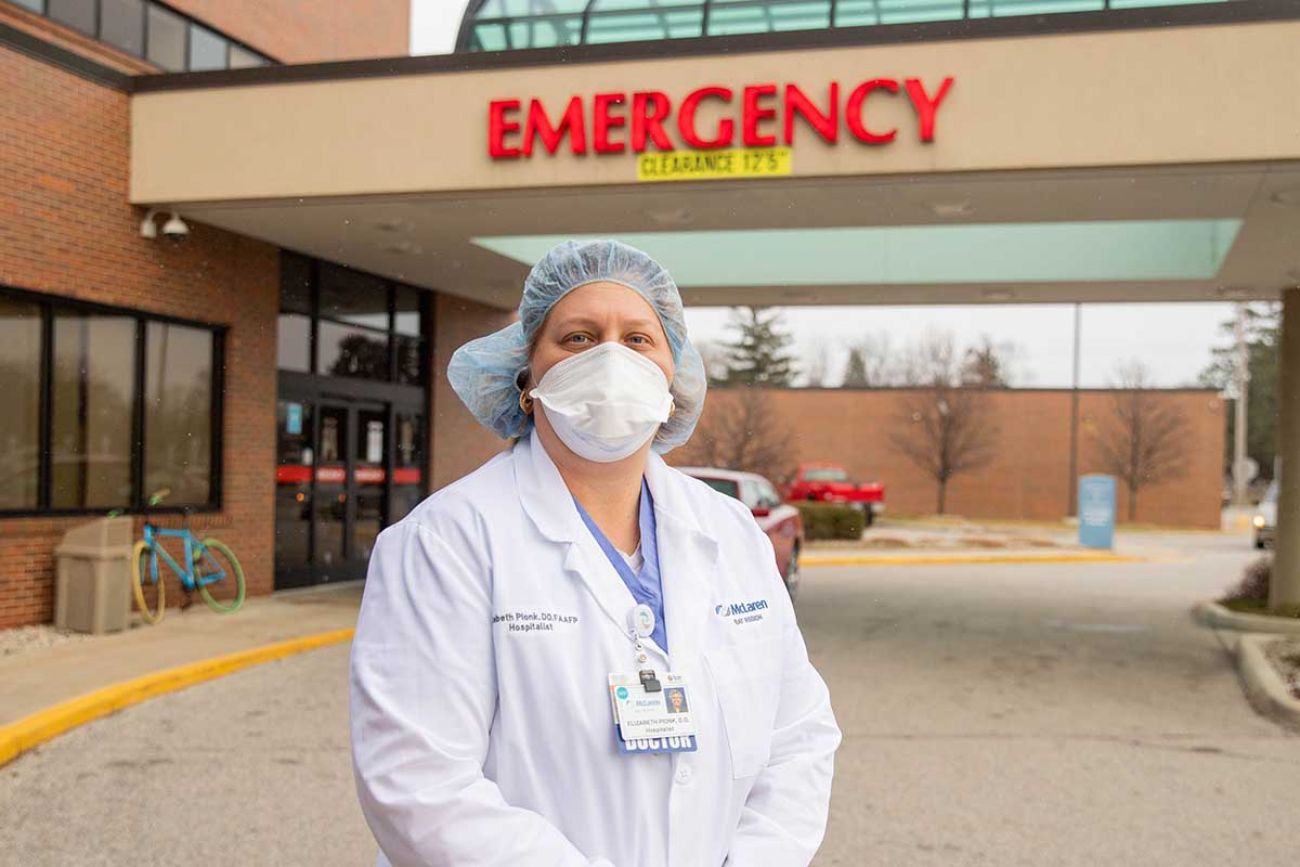
Missed hugs, choir and presents
Throughout Bay City, the pandemic has pulled threads that have unraveled the social fabric of families, businesses, schools and churches. Tracy and Andreas Teich have remained healthy, but Andreas has been forced to put his sermons on YouTube for Messiah Lutheran Church and stay distant from elderly parishioners. For Tracy, not being allowed to sing with the church choir left a bigger hole than she expected.
Democratic County Chairperson Karen Tighe didn’t hug her grandchildren for months this spring and summer, getting no closer than pantomiming messages to them through a kitchen window. Republican County Commissioner Vaughn Begick has seen his 97-year-old mother once since March, when the care facility she lives in was locked down. And even that visit was bittersweet.
“She fell and hurt her hip, so I was able to see her in the emergency room,” Begick said.
Bay City Mayor Kathleen Newsham is an extrovert by nature, but since COVID, she hesitates to be around people.
“I never thought I’d be that person, but I’m 67 and I have asthma, and things come into play,” Newsham said. “I have a grandson coming in from Iowa from college [for Christmas]. I haven’t seen him since August. He has to quarantine, I probably won’t see him unless he does a drive-by and I wave to him.”
Dani Sepos will put just a single gift under the Christmas tree for her son, Jamison, who turns 1 in January. The colorful Rollin’ Rovee from Fisher Price lights up, makes sounds and plays peek-a-boo. Its price on Black Friday was about $35, which Sepos was able to spend because she’s combed low-price stores for little things she can give her parents and family.
Working in the restaurant industry during the pandemic keeps a person in financial survival mode, she said. So at Christmastime this year, Sepos said, “everyone knows it’s not about presents.”
Sepos was the bar manager at Old City Hall and had just returned from maternity leave when the state closed non-essential businesses in the spring. Since then, she’s waited weeks for unemployment benefits, returned to work, bought a house and — once again in the fall — had to seek unemployment before being called back to work.
She now has a smaller staff preparing takeout, but is grateful the restaurant invested in five “igloos” so some in-person dining can take place.
Sepos considers herself fortunate since her bills are paid and her credit cards will be paid off soon. But the pressure of not knowing what could happen next or how much income will come in never lets up. For the first time, she applied for state food assistance which she used to buy meat she can freeze, in case she needs it in the future.
“It’s easy for me to forget because I'm back to work about how defeated you feel when you can’t provide for your family,” she said. “You get to a point where you don’t know what to do.”
‘Nobody’s coming’
That same frustration is felt among owners of small businesses and restaurants in town. On North Euclid, the Euclid Motel shouldn’t have an empty parking lot in mid-December, said Zita Patel, who waited in a back office for customers to ring the bell at the front desk. There is a Christmas tree in the lobby ready for visitors returning home to Bay City for the holidays. Last year, the motel’s 36 rooms were filled. This season, less than a third are booked.
“Nobody’s coming,” Patel said.
Next door, Michele Stender said she hasn’t paid any bills for The Hair Shop since COVID hit town. Eight stylists usually rent chairs at the salon she co-owns. Last Wednesday, only two other stylists were working.
Stender said a few were scared to work. Others may be taking care of children.
And some “are making more money sitting at home,” with unemployment checks totaling more than they were likely to make at a salon many customers are afraid to enter.
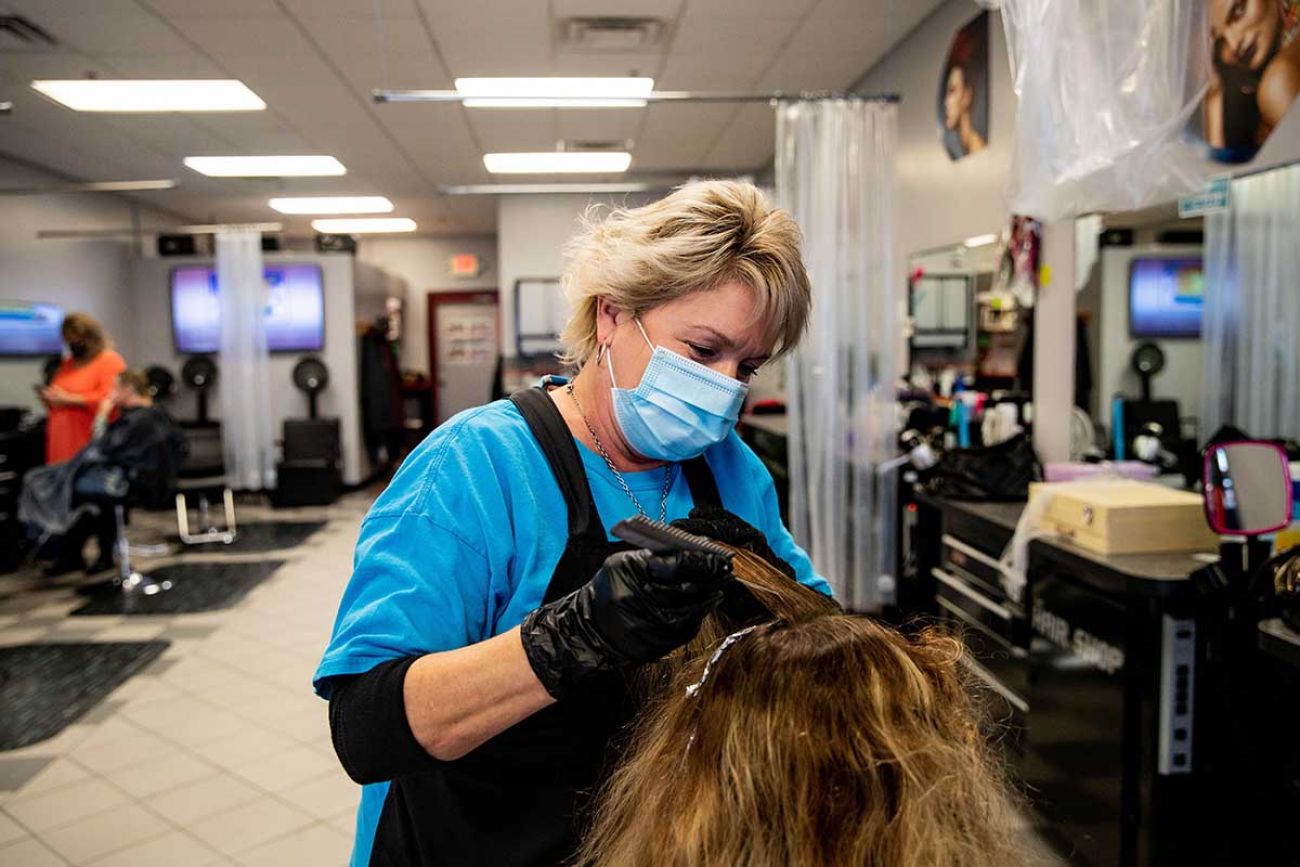
Stender said at least seven nearby salons have gone out of business. “I don’t know how long it can go on before I have to actually close the doors,” she said. “It all depends on how long the landlord can wait.”
The pandemic has placed burdens on an economy already struggling to find its feet. Bay City is at the northern end of the I-75 corridor that links metro Detroit with a satellite of counties that have traditionally benefited from the auto industry. Roughly 1,500 people made good money working at the General Motors powertrain plant in town as recently as 1999; two decades later, the number of hourly and salaried workers is down to 464.
The most recent Census data, released in December, show that household incomes in Bay County were nearly the same in 2019 as they were five years earlier, even as incomes across the state rose 8 percent.
Yet the community rallied in recent years to make the most of a downtown located on the banks of the Saginaw River. Redevelopment focused on bars, restaurants and festivals to attract visitors. The city added residents to converted upper-level apartments and new condos. Now developers look to the day when downtown will connect to the newer Uptown district – where 100 new apartments are under construction — just a half-mile up river.
Bay City started 2020 with optimism driven in part by its riverfront development. “We were thriving,” said Ryan Tarrant, president and CEO of the Bay Area Chamber of Commerce.
COVID-19 has, for now, stalled that momentum.
- The latest: Michigan coronavirus unemployment, map, curve, updated COVID-19 news
- Dashboard: Michigan coronavirus testing numbers, trends, COVID-19 data
Since the pandemic, one in 25 jobs in Bay County has disappeared. There were 2,400 fewer jobs in October than 12 months earlier, a decline of 4 percent, compared to a 1 percent drop statewide.
Thirty-eight of those lost jobs were at MI Table, an upscale, farm-to-table restaurant that opened a year ago. The restaurant, spread over two levels with unique lighting, a custom-made bar and a design and menu that celebrated Michigan, quickly became a downtown anchor as the first tenant in a former bank.
The troubles started in March, when the restaurant was stuck with $3,000 in burritos after the big St. Patrick’s Day parade was canceled in the first days of the pandemic by Mayor Newsham for fear the virus would spread through the crowds.
Instead, owner Amberlyn Hales let her staff “shop” from her freezer. The restaurant closed when Gov. Gretchen Whitmer ordered indoor dining shut down in the spring, and Hales laid off her staff.
MI Table reopened and did brisk business in the summer, but now it is closed for everything but carryout.
“We went from a staff of 40 to, right now, two,” Hales said. “It’s heartbreaking.”
Hurting even the healthy
Residents are hunkering down and home and wearing masks when they venture out now, but Bay County Health Officer Joel Strasz said he worries that “COVID fatigue” will lead residents to stop being cautious, or think they are safe.
Some people believe their risk is minimal because those they have seen die are typically old, infirm or both, Strasz said. They rationalize COVID victims “had it coming, they were going to go,” Strasz said. “They don’t really care about it til it hits close to home.”
But the impact of COVID has leached into most people’s lives, whether or not they’ve had direct contact with the virus.
Thackery, the woman who lost her mother in April, sees the domino effect of the pandemic in video calls. Like most workers at Dow Chemical headquarters in Midland, she’s logged in from home since March.
“It’s a running joke that we don’t wear professional clothes and we work all day in sweatpants,” she said.
That’s meant the professional clothes Thackery and other white-collar workers would normally wear to the office now hang in closets and don’t need to be dry cleaned. Neither do the dresses and suits that would be worn at funerals and weddings that have been postponed or limited to close family.
Which has led revenue to plummet 75 percent at Clayton Cleaners on Midland Street. Business there now is mainly draperies and blankets, said owner Karen Labean.
The drop in dry cleaning, in turn, means a drop in customers dropping off wrapped presents in a Toys For Tots box in the front of her store.
“It wasn’t at all uncommon in years past to get so many toys in the front of this store that you couldn’t move,” Labean said, pointing to a photo showing a lobby filled with wrapped gifts.
Needy children will receive fewer toys in a year when there is far greater need than normal.
The Salvation Army typically has 17 holiday bell-ringers with black pots to raise funds; this year, there are two. Volunteers didn’t want to be in public spaces, said Salvation Army Major Rick Ray.
As of Dec. 16, only $44,000 of a $100,000 Christmas goal had been raised. Last year, there were 25 boxes set up around town to collect donated coats. This year, there are seven. The busiest coat dropoff box, outside the public library, isn’t there this year because the library is closed.
Demand is growing for all services, Ray said. The emergency food pantry, housing assistance and utility payment all have more requests this year for help.
“We’re seeing a lot of new families,” he said. “Some of it is working-class families where they’ve had hours cut and need something to get by.”
The Salvation Army’s community center was busy last week as its service missions collided over three days. Volunteers held radios and coordinated contactless pickups of food boxes and donated gifts, while other volunteers packaged a daily lunch for a second line of people wending through the parking lot. Dessert donations came in one door; food boxes and household essentials left through another.
The rising numbers of residents in need would make any CEO nervous, but Major Ray — dressed in a Christmas-themed suit and Santa hat to hand out gifts that will reach 200 families — said “we have faith” it will work out.
‘It’s going to get better’
Many of the people we talked to said they believed the worst is over, now that vaccines are beginning to be distributed. But Pionk, the physician, said she worried the pandemic’s damage would linger after the virus.
“It’s hard to say how this will manifest itself in people six months, six years after COVID,” she said. “The effect will be profound and long-lasting.”
Jeff Doan has a more optimistic view. This would have been the 30th year his family has run the Santa House, where in a normal holiday season 10,000 kids visit with Santa Claus. This year, Santa House is shuttered.
“We were going to have to disinfect after every family,” Doan said. “We couldn’t do it.”
Instead, the Santa House offered families an opportunity to Zoom with Santa. There were 480 two-minute slots made available over three weekends; all were snapped up.
What was remarkable about those virtual visits, Doan said, was how normal they were. Children who’ve been isolated from school friends for most of the fall, some of whom had relatives with COVID, were filled with the same joy and wonder as they were in years past.
“Leave milk and cookies for me, and I’ll be there on Christmas,” Doan said he tells the children. “Nothing will stop Santa.”
“I’m a cup half-full kind of guy,” Doan said. “I try to stay positive and hope this ends sooner rather than later.”
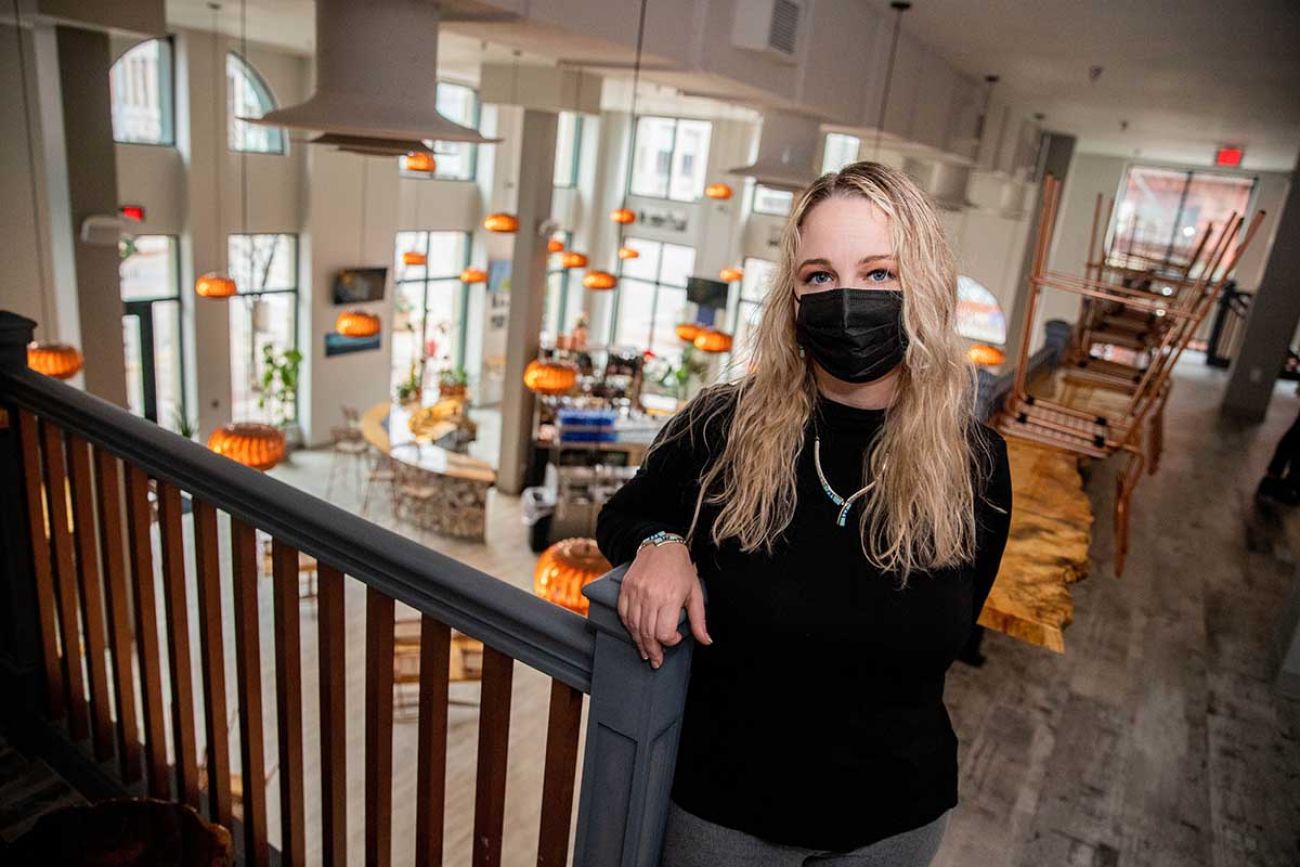
Walker, the third-grade teacher, said she is slowly overcoming her stress. She’s taking walks, sleeping more, and reading to take her mind off work. “I set a goal of reading 25 books this year,” she said. “So far, I’ve read 97.”
Lisa Thackery is also making plans. Her mother’s ashes remain at a funeral home eight months after her death, awaiting a time when the family can gather to lay her to rest alongside her husband, beneath a bench in the Floral Gardens Cemetery on Cass Avenue. In the meanwhile, her family has raised $5,000 in her mother’s name to help support Bay City businesses crippled by the pandemic. The Bay Area Chamber of Commerce sold another $60,000 in local gift cards after Thanksgiving.
On the south side of town, Earl and Michelle Bovia will spend Christmas Eve at their restaurant, selling as many dinners as they can at Bay City Bill’s Bar & Grill. By then, Earl’s fundraiser for the city’s laid-off service industry workers will have helped him send food baskets and cash to at least 35 families.

Earl speaks of the small-town feel to Bay City, and how the pandemic brings out “the common decency” in folks. He said the fundraiser topped $4,500 in a week. He started a Facebook page, too, to encourage people to support restaurants offering carryout. The group now has more than 10,000 people.
“This is about us,” he said, “not me.”
At noon last Thursday, a delivery vehicle containing the first shipment of the coronavirus vaccine arrived in Bay City. Doctors Pionk and Dandamudi were among the first to receive shots, along with frontline workers at McLaren Bay.
Dave Clements frequently drives past the Christmas tree he helped put up. Sometimes, he sees families gather in front of the 36-foot tree to take photos, taking their masks off just long enough to smile for the camera.
“The virus has so many people down right now” he said.
“But it’s going to get better.”
See what new members are saying about why they donated to Bridge Michigan:
- “In order for this information to be accurate and unbiased it must be underwritten by its readers, not by special interests.” - Larry S.
- “Not many other media sources report on the topics Bridge does.” - Susan B.
- “Your journalism is outstanding and rare these days.” - Mark S.
If you want to ensure the future of nonpartisan, nonprofit Michigan journalism, please become a member today. You, too, will be asked why you donated and maybe we'll feature your quote next time!



